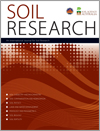Understanding the factors influencing copper toxicity is essential for safe grape production amid increasing copper accumulation in vineyards. This study investigated how different soils and copper salts and concentrations influence copper toxicity in vineyard soils and the effects on vine growth – our findings reveal that soil type and type of copper salt significantly influence copper toxicity, affecting vine safety and production. These findings help in assessing environmental risks of copper and designing tailored remediation strategies.

Volume 63 Number 6 2025
North-west Cambodia’s rapid shift towards annual crop cultivation has come at a cost. Forests have been cleared, leading to a decline in soil health as evidenced by reduced organic matter, nutrients, and beneficial organisms. To ensure the long-term viability of these ecosystems, policymakers should evaluate the economic impact of soil degradation and promote sustainable practices like conservation agriculture and agroforestry, alongside mechanisms to invest in soil restoration.
SR24093 Abstract | SR24093 Full Text | SR24093PDF (5.1 MB) Open Access Article
Why do invasive alien plants rarely suffer from diseases? This study found that the commonly present arbuscular mycorrhizal fungi in soil can regulate the allocation of aboveground and underground growth of invasive alien plants, thereby resisting infection by soil pathogens. Therefore, if the symbiotic relationship between plants and microorganisms is disrupted, the expansion of invasive alien plants may be controlled easily.




